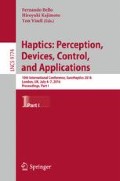Abstract
We investigate the effect of procedure-specific parameters on the performance of three common psychophysical procedures. Methods considered include transformed-staircases, the \(\varPsi \)-method and the UML method, while performance is evaluated in terms of accuracy, efficiency, precision and robustness. Simple Yes/No- and three alternative forced choice response paradigms were considered. A Monte Carlo simulation was conducted for three different types of test persons and analyzed by analysis of variances. Results show a large effect of the test person on the performance, especially for staircase procedures. No parameter exhibited a relevant effect on accuracy for each analyzed methods, estimation precision can be increased with an increasing number of trials. Only for staircase procedures, efficiency can be influenced by the choice of the progression rule.
Access this chapter
Tax calculation will be finalised at checkout
Purchases are for personal use only
References
Cornsweet, T.: The staircase-method in psychophysics. Am. J. Psychol. 75(3), 485–491 (1962)
Ehrenstein, W.H., Ehrenstein, A.: Psychophysical methods. In: Windhorst, U., Johansson, H. (eds.) Modern Techniques in Neuroscience Research, pp. 1211–1241. Springer, Heidelberg (1999)
Field, A.: Discovering Statistics Using IBM SPSS Statistics. Sage, New York (2014)
García-Pérez, M.A., Alcalá-Quintana, R.: The difference model with guessing explains interval bias in two-alternative forced-choice detection procedures. J. Sens. Stud. 25(6), 876–898 (2010)
Green, D.: Stimulus selection in adaptive psychophysical procedures. J. Acoust. Soc. Am. 87(6), 2662–2674 (1990)
Harvey, L.O.: Efficient estimation of sensory thresholds. Behav. Res. Methods 18(6), 623–632 (1986)
Hatzfeld, C., Kupnik, M., Werthschützky, R.: Performance simulation of unforced choice paradigms in parametric psychometric procedures. In: World Haptics. Evanston, IL, USA (2015)
Jäkel, F., Wichmann, F.A.: Spatial four-alternative forced-choice method is the preferred psychophysical method for naïve observers. J. Vis. 6(11), 13 (2006)
Kaernbach, C.: Adaptive threshold estimation with unforced-choice tasks. Percept. Psychophys. 63(8), 1377–1388 (2001)
Karmali, F., Chaudhuri, S.E., Yi, Y., Merfeld, D.M.: Determining thresholds using adaptive procedures and psychometric fits: evaluating efficiency using theory, simulations, and human experiments. Exp. Brain Res. 234(3), 773–789 (2016). doi:10.1007/s00221-015-4501-8
Kontsevich, L., Tyler, C.: Bayesian adaptive estimation of psychometric slope and threshold. Vis. Res. 39(16), 2729–2737 (1999)
Leek, M.R.: Adaptive procedures in psychophysical research. Percept. Psychophys. 63(8), 1279–1292 (2001)
Levitt, H.: Transformed up-down methods in psychoacoustics. J. Acoust. Soc. Am. 49(2), 467–477 (1971)
Madigan, R., Williams, D.: Maximum-likelihood psychometric procedures in two-alternative forced-choice: evaluation and recommendations. Aten. Percept. Psycho. 42(3), 240–249 (1987)
Otto, S., Weinzierl, S.: Comparative simulations of adaptive psychometric procedures. In: DAGA. Rotterdam, NL (2009)
Shen, Y., Dai, W., Richards, V.M.: A matlab toolbox for the efficient estimation of the psychometric function using the updated maximum-likelihood adaptive procedure. Behav. Res. Methods 47(1), 13–26 (2014)
Shen, Y., Richards, V.M.: A maximum-likelihood procedure for estimating psychometric functions: thresholds, slopes, and lapses of attention. J. Acoust. Soc. Am. 132(2), 957–967 (2012)
Taylor, M., Creelman, C.: Pest: efficient estimates on probability functions. J. Acoust. Soc. Am. 41(4), 782–787 (1967)
Wickens, T.D.: Elementary Signal Detection Theory. Oxford University Press, Oxford (2002)
Acknowledgments
This research was supported by Deutsche Forschungsgemeinschaft (DFG) under grant HA7164/1-1.
Author information
Authors and Affiliations
Corresponding author
Editor information
Editors and Affiliations
Rights and permissions
Copyright information
© 2016 Springer International Publishing Switzerland
About this paper
Cite this paper
Hatzfeld, C., Hoang, V.Q., Kupnik, M. (2016). It’s All About the Subject - Options to Improve Psychometric Procedure Performance. In: Bello, F., Kajimoto, H., Visell, Y. (eds) Haptics: Perception, Devices, Control, and Applications. EuroHaptics 2016. Lecture Notes in Computer Science(), vol 9774. Springer, Cham. https://doi.org/10.1007/978-3-319-42321-0_36
Download citation
DOI: https://doi.org/10.1007/978-3-319-42321-0_36
Published:
Publisher Name: Springer, Cham
Print ISBN: 978-3-319-42320-3
Online ISBN: 978-3-319-42321-0
eBook Packages: Computer ScienceComputer Science (R0)

